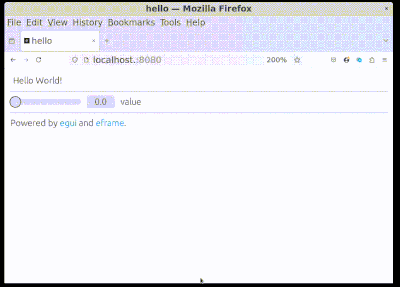4 releases
| 0.1.6 | Mar 5, 2025 |
|---|---|
| 0.1.4 | Mar 5, 2025 |
| 0.1.3 | Mar 1, 2025 |
| 0.1.0 | Feb 28, 2025 |
#179 in WebAssembly
26KB
150 lines
WE_CLAP : Web Enabled Command Line Argument Parser
we_clap
Pronounced "We clap", as in "Give myself a round of applause."
The goal is to be flexible, write your command line code once and it should be able to run anywhere!

Why use we_clap?
You like to use clap, but you want your program to also run on the web.
Find we_clap at crates.io, or the we_clap repository.
Also check out the examples and docs.
Why not use we_clap?
- If you are writing only for the web, you may not be wanting to use command line arguments.
- You might have another use of the url query string.
- You might be compiling to wasm but the framework you use provides
ArgsOsand standard output. - Your program doesn't need command line arguments
- You don't like to use clap. ( Check out
cliw)
How to use we_clap?
we_clap_demo
Cargo.toml
[package]
name = "we_clap_demo"
version = "0.1.0"
edition = "2021"
[dependencies]
# get clap powers
clap = { version = "4.5.30", features = ["derive"] }
# get web ability for clap
we_clap = { version = "0.1.1" , features = ["web-alert"] }
main.rs
use clap::Parser;
use we_clap::WeParser; // Wrapper for clap Parser
// Implement web enabled parser for your struct
impl we_clap::WeParser for Opts {}
#[derive(Parser, Debug, Default)]
#[command(author, version, about, long_about)]
pub struct Opts {
/// A required string
#[arg(short, long)]
pub words: String,
/// An optional value
#[arg(short, long)]
pub value: Option<f32>,
}
fn main() {
// Like magic, this will work on native parsing the command line
// arguments, or on the web parsing the url query string as if it were
// command line arguments, providing clap help and error messages to
// stdout/stderr on native or a popup alert on web/wasm.
// use web enabled parse and it works on native or web.
let opts: Opts = Opts::we_parse(); // Type annotations needed
// this app doesn't do anything, except parse arguments and demonstrate
// clap powers in the web.
}
Running with wasm-server-runner.
cargo r --target wasm32-unknown-unknown
Finished `dev` profile [unoptimized + debuginfo] target(s) in 0.06s
Running `wasm-server-runner /path/to/target/wasm32-unknown-unknown/debug/we_clap_demo.wasm`
INFO wasm_server_runner: uncompressed wasm output is 2.10mb in size
INFO wasm_server_runner: starting webserver at http://127.0.0.1:1334

How does we_clap do it?
We_clap has two traits WeCommand and WeParser that wrap the
the clap::Command struct and clap::Parser trait. These traits have
wrapper functions that you call to fill your derive struct or work with your
command. For example we_parse(), we_get_matches(). These wrappers
get arguments from ArgsOs on native and UrlArgs on the web. They also
handle error and help output like clap on native, on the web the error and
help messages are to the console or popup alert.
See the docs and examples to learn how easy it is to use.
What is UrlArgs
UrlArgs is an iterator. It splits the url into pieces.
- Zeroith arg is the url path.
- The rest of the args, if any, are the full
decodedquery strings.
The query strings start at first '?' character and are delimited by '&' - Anything after a hash '#' is discarded.
UrlArgs Example
let url = "http:///www.example.org/index.html?--first&second&third#discard".to_string();
let mut args : cliw::url_args::UrlArgs = url.into();
assert_eq!(args.next().unwrap(),"http:///www.example.org/index.html");
assert_eq!(args.next().unwrap(),"--first");
assert_eq!(args.next().unwrap(),"second");
assert_eq!(args.next().unwrap(),"third");
assert_eq!(args.next(),None);
We_clap Features
Web output functionality of the we_clap crate is gated by features.
- web-alert
- Enable output to browser popup alert.
- web-console
- Enable output to browser console.
- Set by default
License
Copyright 2025 Richard Gould
Licensed under either of
- Apache License, Version 2.0 (LICENSE-APACHE or http://www.apache.org/licenses/LICENSE-2.0)
- MIT license (LICENSE-MIT or http://opensource.org/licenses/MIT)
at your option.
Contribution
Unless you explicitly state otherwise, any contribution intentionally submitted for inclusion in the work by you, as defined in the Apache-2.0 license, shall be dual licensed as above, without any additional terms or conditions.
Dependencies
~1.1–3MB
~56K SLoC